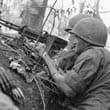For the average American the events of 59 years ago are ancient history, but that is not the case for the aged, but still powerful generals in the North Korean Army. They remember well their youth and those first months of their war. Re-fighting it has been their dream.
It took only three days after their attack began on June 25, 1950, for the North Korean army to slash past the Republic of Korea’s (ROK) poorly equipped and trained units and capture the South’s capital city of Seoul. The Russian trained and equipped forces of the North found little opposition among the ROK soldiers already weakened by political propaganda efforts undermining their loyalty to the unpopular ROK government of Syngman Rhee.
The U.S. Task Force Smith made up of the under-strength 1/21st of the 24th Division arrived in-country from Japan on July 1 and had traveled by truck and train north for four days. They were supposed to link up with an ROK regiment, but it was nowhere in sight. The hardscrabble hills near Osan that they were told would be their defensive positions barely allowed the smallest of foxholes for protection. The theory was that these 431 men would hold up the advance of the tanks and troops of the North Koreans. They took 155 casualties on that day and during their stumbling fighting retreat over the next five days to the nearest American lines.
Large segments of the ROK Army defected and civilians by the tens of thousands fled south on foot. For the first several months — or until the American forces were able to reinforce and reconstitute their forces around the Pusan perimeter — the North Koreans were well on their way to cleansing the peninsula of all foreign and ROK presence. It could happen again if Pyongyang decides the timing is propitious for an attack
General George Casey, Army Chief of Staff, recently stated quite frankly that it would take ninety days to move forward an adequate force to block an attacking North Korean army. Using this official military assessment as their guide, there is no reason to believe the NK military leadership would hesitate to assure their Dear Leader of an effectively full occupation of the Korean Peninsula within that time period.
The NK forces would have to plan on capturing a considerable portion of their fuel supply as they moved forward blitzkrieg fashion as they had done once before. While this may seem unduly optimistic, it is not illogical in terms of strategy — especially with a revanchist General Staff and a well-equipped army of 1.2 million eager to go on the offensive.
From the U.S. standpoint air strategy would include an immediate destruction of all known DPRK nuclear facilities by conventional explosives at the same time as oil and refined product facilities were being hit. It would have to be accepted that U.S. air assets would suffer serious losses in this effort to stall the NK offense and at the same time destroy their nuclear capability.
If the 28,500 U.S. and 650,000 ROK forces currently on alert in South Korea were unable to repeat the 1950 success in holding a defensive perimeter, the DPRK could gain control of the entire peninsula without a single nuclear explosion. The next step would be a negotiated settlement in which the Chinese would play a major part. Kim Jong-il and his heir-apparent, Kim Jong-un, would rule a united Korea and be heading toward recognition as an equal power to Japan.
The North Koreans know that their “first-use” of a nuclear weapon would bring total nuclear destruction to their nation. The U.S. gains nothing tactically or strategically by using its own considerable nuclear arsenal.
Most disturbingly, if the regime of Kim Jong-il really has come to the point of desiring to re-fight the war of 1950, a full-scale conventional war is an available alternative. With the admitted delay of three months for adequate U.S. reinforcement, as stated by General Casey, the chance exists once again for a non-nuclear attack from the north.
There is another encouragement to such an invasion. The government in Pyongyang has every reason to believe that the appeasement-oriented Obama Administration certainly will delay a definitive response; thus giving more than adequate time for the North Korean buildup.
Would the Chinese act economically and politically to curb the DPRK enthusiasm for the attack? Possibly, yes, but this factor already would have been taken into consideration by Pyongyang.
The underlying guidance of the spirit of North Korea, Juche, broadly meaning self-reliance, was the theme of the leadership of its founder, Kim Il Sung. This more than anything will drive his son and grandson’s decision making. The Kim dynasty is perceived to be at stake, and they will do anything to keep themselves in power.
























